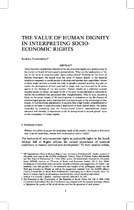The value of human dignity in interpreting socio-economic rights
Abstract
There has been considerable criticism of the use of human dignity as a guiding value in the context of South Africa's equality jurisprudence. What are the implications of the use of the value in socio-economic rights jurisprudence? Drawing on the work of Martha Nussbaum, the article links the value of human dignity to the material conditions necessary to enable people to develop and exercise their capabilities. Access to basic social services is crucial not only to people's physical survival, but also to enable the development of their potential to shape their own lives and to be active agents in the shaping of our new society. Human dignity as a relational concept requires society to respect the equal worth of the poor by marshalling its resources to redress the conditions that perpetuate their marginalisation. This, in turn, requires a focus on the actual impact of the state's actions or omissions on the life chances of disadvantaged groups, and a response that is proportionate to the seriousness of that impact. In constitutional adjudication, it requires that a high burden of justification is placed on the state in cases involving a deprivation of basic human needs. The article concludes by examining how the Constitutional Court's reasonableness review standard and remedial jurisprudence could be strengthened to accord greater value to this conception of human dignity.

